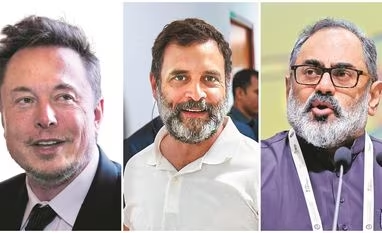Tesla and SpaceX Chief Executive Officer (CEO) Elon Musk has said that electronic voting machines (EVMs) should be eliminated as they are prone to “getting hacked” by humans or AI (artificial intelligence).
“We should eliminate electronic voting machines. The risk of being hacked by humans or AI, while small, is still too high,” Musk said in a post on X.
The billionaire was reacting to irregularities reportedly discovered in EVMs during Puerto Rico’s primary elections.
It has reignited controversy around EVMs in India.
Leading politicians such as INDIA bloc leaders such as Rahul Gandhi and Akhilesh Yadav, pointed to Musk’s post to underline the lack of accountability on EVMs.
Former information technology minister and Bharatiya Janata Party (BJP) leader Rajeev Chandrasekhar termed Musk’s post a “sweeping generalisation” and offered to “run a tutorial” for the Tesla chief on how India ensures its indigenously manufactured EVMs are hacking proof.
More From This Section
In response, Musk replied: “Anything can be hacked”.
Chandrasekhar, who lost the Lok Sabha polls from Thiruvananthapuram to Congress leader Shashi Tharoor, said Musk’s view may apply to the US and other places where they use regular computer platforms to build Internet-connected voting machines.
The irregularities in EVMs were resolved since there was a paper trail that helped the tallying of votes. Puerto Rico’s Election Commission said it was reviewing its contract with a US electronic voting company, according to the Associated Press.
A software issue caused machines supplied by Dominion Voting Systems to incorrectly calculate vote totals in Puerto Rico, where 600 such machines were used, the Associated Press report said.
On April 26, the Supreme Court (SC) dismissed all petitions seeking 100 per cent cross-verification of votes cast using EVMs with the slips printed by the Voter Verifiable Paper Audit Trail (VVPAT), or alternatively, a return to the system of ballot papers. A review petition was filed last month, arguing that the apex court overlooked the vulnerability of symbol loading units and the necessity for their audit.
In their order, the judges said it “is apparent” to them “that a number of safeguards and protocols with stringent checks have been put in place”. The SC said “data and figures” placed before “do not indicate artifice and deceit”.
Responding to Musk’s post, Congress leader Rahul Gandhi said that in India EVMs are a “black box” that nobody is allowed to scrutinise.
“Serious concerns are being raised about transparency in our electoral process. Democracy ends up becoming a sham and prone to fraud when institutions lack accountability,” Gandhi posted on X, appending a recent news report that said police were investigating a relative of Shiv Sena’s Mumbai North West candidate Ravindra Waikar, who won the Lok Sabha polls by 48 votes.
According to the media report, Waikar’s relative, who was present at the counting centre on June 4, had a mobile phone connected to the EVMs, which received an OTP that purportedly unlocked the machine.
Senior Congress leader and former Maharashtra chief minister Prithviraj Chavan said the poll result of Mumbai North West Lok Sabha seat must be stayed.
"The EVM is a standalone system and there is no need for an OTP to unlock it. It is not programmable and has no wireless communication capabilities. It is a complete lie being spread by a newspaper," Vandana Suryavanshi, returning officer of Mumbai North West Lok Sabha constituency, said in a press conference on Sunday.
Mumbai police also quashed the media report, terming it as “fake news.”
Samajwadi Party chief Akhilesh Yadav also questioned the BJP’s intriguing obstinacy to continue with the EVMs when experts worldwide were flagging concerns about these machines. He reiterated his party’s demand to conduct all forthcoming elections through ballot papers.
What triggered Musk’s post
Elon Musk’s post on EVMs was triggered after Puerto Rico’s election commission said last week that it was reviewing its contract with a US electronic voting company after discrepancies were discovered following the island’s primaries, according to the Associated Press.
The issue stemmed from a software issue that caused machines supplied by Dominion Voting Systems to incorrectly calculate vote totals, Jessika Padilla Rivera, the commission’s interim president, was quoted as saying by AP.
More than 6,000 Dominion voting machines were used in Puerto Rico’s primaries, with the company stating that software issues stemmed from the digital files used to export results from the machines, it said. Agencies
)